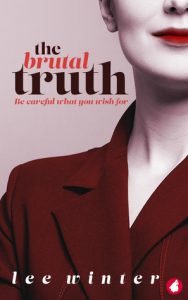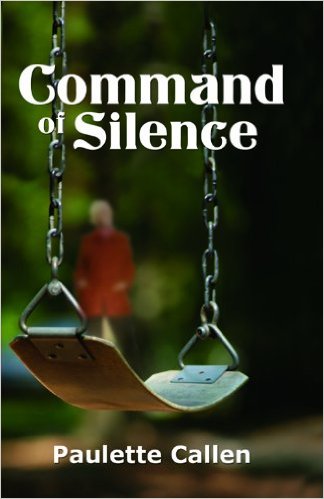An easy elevator pitch for The Brutal Truth by Lee Winter is “It’s The Devil Wears Prada, the movie version, but as a lesbian romance!” But it goes beyond that, and it might be more appropriate to say “This was possibly inspired by someone who wanted to see what the Meryl Streep/Anne Hathaway characters would look like if they were attracted to each other and eventually fell in love, but then took that premise and added new dimensions, depth, and plot twists.” In other words, this isn’t a lesbian retelling of an existing movie; it’s an original story that used the idea of Miranda/Andie (called Elena and Maddie) for the relationship dynamic but then brought in elements of both very timely serious issues and wish-fulfillment career successes that weren’t in the original.
Elena her movie parallel Miranda (I haven’t read the other book) might both be hardened fashion billionaires, but Elena’s buried, overprotected softness is more reachable than Miranda’s, and is ultimately redeeming instead of tragically impotent. I could see this book being absolute catnip, the 24-pack of gourmet chocolates, for a reader attracted to villains who just need a bit of calming down and who are ultimately good inside. (After all, many of us who like villains don’t actually like their bad behavior — we’re drawn to the aesthetic: the power, the confidence, the style. Give me a smirk that’s safe to love, I always say.)
Personally, I was never drawn to Miranda/Andie as a fandom so I’m proof that this book can stand on its own and appeal to a broad range of readers: I think that anyone who is a fan of the pairing will find that it hits all those notes perfectly, but those who aren’t, can, as I did, enjoy it for its chemistry and all the new plot elements that had nothing to do with Devil.
Two more groups of readers who might want to check this book out are twentysomethings looking to see themselves reflected in that New Adult place in life, the “I’m out of college but not really sure if the job it got me is the job I actually want” uncertainty, and also anyone looking for age-gap lesbian romance of the mid-twenties-with-fortyish variety. It’s also different from the other billionaire romance I’ve read inasmuch as Maddie’s biggest wish-fulfillment successes are her own doing. Oh, and another reason to read: if you like redheaded protagonists!
Speaking of the protagonist, Madeleine (who goes by Maddie), worms her way into Elena’s consciousness by being more genuine than everyone else in her orbit. She isn’t interested in cutting edge fashion at all, or in sycophanting to Elena (which Elena finds intriguing and refreshing), and even her melancholy is part of her charm because she’s not fronting to cover it up. It’s reassuring to exist as a reader in a world where that’s seen as honesty and a positive.
Brutal Truth does a really good job of building personal chemistry between the two leads in addition to physical chemistry. I’m well familiar with the feeling of a slowly growing awareness of another person, of starting to care for someone in that invisible way where you don’t even notice how much you’re thinking about them until you miss them, of friendship growing organically without any deliberate plans. Maybe that’s why it works so well — the growth of their friendship, even over Elena’s huge walls and Maddie’s independence, is so well documented that it lends a depth and value to the romance once it comes out from behind the clouds. In other words, there’s a foundation there that then wears the sexual attraction as well as one of Elena’s designer gowns, rather than being sexual attraction that a writer has attempted to shove emotional connection into without regard for fit.
One thing I really appreciated about this book is that every time it might have gone down the path of the dreaded If Only People Would Stop Immediately Believing The Worst About Their Friends And Loved Ones misunderstandings that are such a backbone of romance lit but not at all to my personal taste — it didn’t. The situation calmed down fairly quickly each time, people communicated, or there was never a problem at all. In a plot already heavy-laden with sexual harassment (from men, not from Elena), professional jealousy, career path confusion and ambivalence, and the hot/cold nature of Elena and Maddie’s relationship, there’s no need to manufacture additional conflict that wouldn’t ring as true as all of those other things anyway.
I also found writerly skill in the way Elena’s newfound attraction to women added a dimension to her lifelong love of beauty instead of just “explaining” it.
I want to give some details about the sexual harassment subplot so that sensitive readers can make their best call. Personally, I think it was handled really well, if almost wish-fulfilment in the depth of how thoroughly the problem was rooted out, but we read billionaire romance in which regular twentysomethings end up dating their wealthy, well-connected bosses for the wish-fulfillment, right? So just enjoy the ride, if it’s not a topic you’d find triggering. On that note I do want to say that while everyone’s triggers are different, I personally think the details of the men’s behavior was kept so off-screen that really all you read about is the women’s reactions and the men’s eventual punishment. This is not a book that’s going to put you in the shoes of the survivors during their moments of distress, and I think that was a wise decision.
I really like the way this book respects and treats with dignity, people —women — who are not chirping and cheerful social butterflies all of the time. Characters who are going through times of questioning their life choices, characters with extreme aversion to socializing, characters who aren’t an open book and don’t want to be — these are all depicted positively, and as valid instead of villainized, and not in need of changing or “fixing” by the plot.
It’s mentioned in passing that Elena, like Miranda in the book version of Devil, is Jewish, but there’s nothing to indicate that we mean anything to her in present day (in fact, one of her surprise secret donations so that the audience, through Maddie, finds out that she’s got a heart of gold after all, is to a Polish community center, not a Jewish one.) However, there are a million valid and diverse Jewish experiences and if you see yourself reflected in this one, have at. We definitely matter whether we are 100% secular and not interested in the traditions or as frum as humanly possible, and everything in between (hi.)
Content warnings for two or three times where Elena’s having had two husbands is held up as a reason to assume she’s not interested in women–yes, most women with ex-husbands are straight, but bisexuality as a possibility is never even brought up at all and since all of this applies to me personally I just noticed it each time. The discussion of a white journalist in modern-day Vietnam near the end of the book had a bit of a white savior scent to me, including a lauded photograph of a grieving orphan, but as always, I will defer to Vietnamese/Vietnamese-diaspora people here. (It’s not a key plot element.) I also noticed one line of dialogue in the mouth of an often-outrageous secondary character that seems to exclude aromantic people, although again this is not my lane.
One more note: I recently read a book that many reviews warned me had partner sexual assault, but none of the reviews made it clear that the assault was perpetrated by a villain, not by the hero. Sexual assault by the hero is a dealbreaker for me personally, but for a villain, it’s not. So I want to make it abundantly clear that the harassment was perpetrated by male characters off screen, not by Elena.

